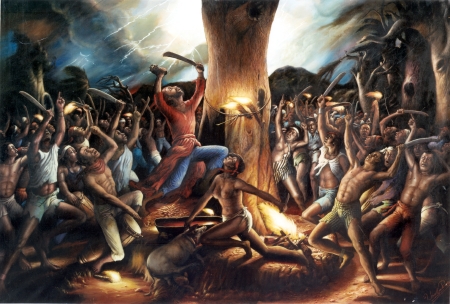Or: Waiting, Watching, Looking.
A summary of where we are so far: we occupy but there is not an occupation (in New York). The movement is now, it is over, it is coming (back). What do we do when we are in this future present of Occupy? We wait, we watch and we look.
If you’ve read any of these writings, you’ll know that I am haunted by the resonant phrase adopted by Jacques Rancière, in which the police say to us “move on, there’s nothing to see here.” Only there is, and we know it and so do they. The question is, who has the authority to claim to “see” the social. In refusing to move on, we claim the right to look.
Occupy will be (future present) so resonant a strategy because it does not just claim the right to look at the abstract level of look-to-look, but it takes over the symbolic space in-between that it reconstitutes as autonomy. I do not have autonomy: we do. It is that possibility from which we were always already supposed to be moving on. Thus the evictions were justified as the hygienic cleansing of vermin, rather than as politics because those who were there had no right to be where they already were: in the political.
”] For Rancière, that would be for the part that has no part to assert its place. I agree. The means by which we register that claim is to recognize one another. In person, we do that by exchanging a look, eye to eye, that oscillates between us and claims that space as autonomous. It is present but as it crosses between us, it anticipates a future that it is come.
For Rancière, that would be for the part that has no part to assert its place. I agree. The means by which we register that claim is to recognize one another. In person, we do that by exchanging a look, eye to eye, that oscillates between us and claims that space as autonomous. It is present but as it crosses between us, it anticipates a future that it is come.
Collectively, it registers the sense that democracy will either (have been) direct or will not be. Just as the right to look cannot be represented, nor can the democracy in which all have part be representative in the hierarchical sense. The charge of impracticality leveled against such direct democracy since Aristotle, the defender of slavery, can now be met with the use of horizontal peer-to-peer media and accompanying practice. This really is what democracy looks like, it turns out.
As we will be occupying we will invite the world to watch, as we have done since (in media history) 1968. More directly, the world has watched since the Diggers occupied St. George’s Hill in England in 1649 and declared it a “common treasury for all.” Or when the revolutionaries met in what will be Haiti in 1791 and Boukman declared:
Listen to the voice of Liberty, which speaks in the heart of us all
Koute vwa la libète kap chante lan kè nou
Not: “I hear liberty” or “some of us hear it” but we all hear it. We have just waited to act on its suggestions.
Yet the world wears as it grows. We must watch the world as well. We Livestream. Uconnect, Facebook, Tweet. Who imagines that this space will be left open by the Guardians for long?
And so we wait. It is a messianism without the messiah, to quote Derrida thinking about Benjamin and Marx. It is that space between “the world can’t wait” and the necessity of Waiting for Godot. We, the tramps of the world, wait and discourse. It has grown dark but Spring is coming.


Pingback: Futures of Occupy | Occupy 2012